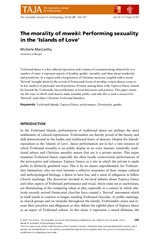The morality of mweki: Performing sexuality in the ‘Islands of Love’
Peer reviewed, Journal article
Published version

Åpne
Permanent lenke
https://hdl.handle.net/1956/15681Utgivelsesdato
2016-08Metadata
Vis full innførselSamlinger
Originalversjon
https://doi.org/10.1111/taja.12191Sammendrag
Trobriand dance is a key cultural expression and a means of communicating subjectivity in a number of ways: it expresses aspects of kinship, gender, morality, and ideas about modernity and primitivity. In a region with a long history of Christian missions, coupled with a recent ‘Revival’ brought about by the arrival of Pentecostal forms of worship, certain dances come to be key markers of particular moral positions. Primary among these is the Tapioca Dance, famed far beyond the Trobriands, but problematic in local discourses and practice. This paper examines the ways in which such dances make sexuality public, and why this is such a concern for ‘Revived’ (and other) Christian Trobriand Islanders.
